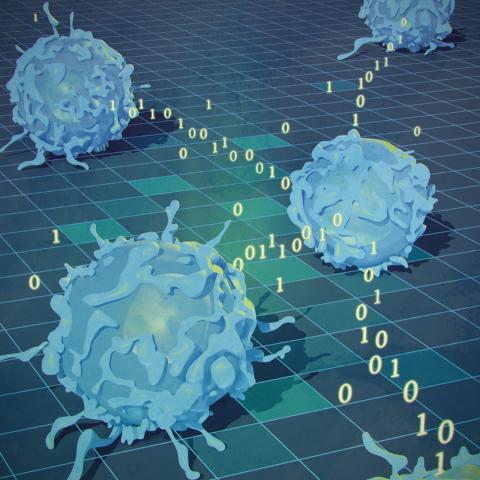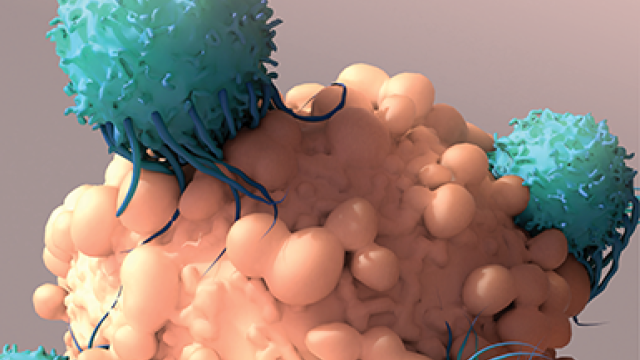
An illustration of immune cells with zeroes and ones, representing CIDE, a new, large-scale immuno-oncology data platform. Credit: Ethan Tyler and Alan Hoofring, NIH Medical Arts
CCR researchers led by Peng Jiang, Ph.D., Senior Investigator in the Cancer Data Science Laboratory, have developed a new tool called the Cancer Immunology Data Engine (CIDE) to identify genes linked to secreted proteins that are associated with immunotherapy outcomes. The team described the new tool and initial findings on July 28, 2025, in Cell.
Despite a long research history, anticancer therapies based on secreted proteins, such as cytokines, growth factors and soluble enzymes, face many challenges. The human genome contains about 1,900 genes encoding secreted proteins, but 61% of these genes have no reported cancer-associated function. This gap stems largely from limitations in the approaches used to study secreted proteins in physiological settings.
To address this hurdle, Jiang’s team developed CIDE, which incorporates 90 “-omics” datasets, such as transcriptomics and genomics, spanning 8,575 tumor profiles with immunotherapy outcomes from 17 solid tumor types. CIDE systematically identified all genes associated with immunotherapy outcomes, which the researchers used to identify secreted proteins that did not already have a known cancer role. Then, they validated the effects of four proteins on immune checkpoint blockade therapies, a type of immunotherapy, in mouse models. They found that the top hit, acyloxyacyl hydrolase (AOAH), enhances the effects of immunotherapies in multiple tumor models by sensitizing T-cell receptors to weak antigens and protecting dendritic cells by depleting immunosuppressive lipids.
The researchers say that all four of the validated proteins may have therapeutic potential. In addition, CIDE is not restricted to studying secreted proteins and could be applied broadly to the characterization of all human genes in cancer.
Citation: Gong, L., et al. Cell. 2025 Jul 28;188. Online ahead of print.
Writeup information provided by: Peng Jiang, Ph.D.


